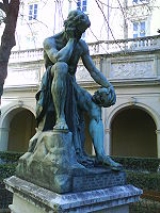
Democritus
Democritus was a pre-Socratic Greek philosopher. He is popularly known as "the laughing philosopher" for advocating a cheerful outlook, and for his rhetorical use of irony and ridicule. Of his voluminous writings, only a few fragments of his ethical theory and descriptions by other writers of his atomic theory remain.
Sourced
- Sweet exists by convention, bitter by convention, colour by convention; atoms and Void [alone] exist in reality.
- Freeman (1948), p. 142
- Variant: By convention [nomos] sweet is sweet, bitter is bitter, hot is hot, cold is cold, color is color; but in truth there are only atoms and the void.
- Durant (1939), Ch. XVI, §II, p. 353; citing C. Bakewell, Sourcebook in Ancient Philosophy, New York, 1909, "Fragment O" (Diels), p. 60
- We know nothing accurately in reality, but [only] as it changes according to the bodily condition, and the constitution of those things that flow upon [the body] and impinge upon it.
- Freeman (1948), p. 142
- Medicine heals diseases of the body, wisdom frees the soul from passions.
- Freeman (1948), p. 149
- Variant: Medicine cures the diseases of the body; wisdom, on the other hand, relieves the soul of its sufferings.
- Coition is a slight attack of apoplexy. For man gushes forth from man, and is separated by being torn apart with a kind of blow.
- Freeman (1948), p. 150
- Man is a universe in little [Microcosm].
- Freeman (1948), p. 150
- Good breeding in cattle depends on physical health, but in men on a well-formed character.
- Freeman (1948), p. 151
- Variant: Strength of body is nobility only in beasts of burden, strength of character is nobility in man.
- Durant (1939), Ch. XVI, §II, p. 354; citing C. Bakewell, Sourcebook in Ancient Philosophy, New York, 1909, "Fragment 57"
- Variant: In cattle excellence is displayed in strength of body; but in men it lies in strength of character.
- Many much-learned men have no intelligence.
- Freeman (1948), p. 152
- Variant: There are many who know many things, yet are lacking in wisdom.
- Immoderate desire is the mark of a child, not a man.
- Freeman (1948), p. 152
- Variant: It is childish, not manly, to have immoderate desires.
- [I would] rather discover one cause than gain the kingdom of Persia.
- Freeman (1948), p. 155
- Variant: I would rather discover a single demonstration [in geometry] than become king of the Persians.
- Durant (1939),Ch. XVI, §II, p. 352, citinas G.Grote, Plato and the Other Companions of Socrates (London, 1875), vol. 1, p. 68; and citing C. Bakewell, Sourcebook in Ancient Philosophy, New York, 1909, p. 62.
- Men have fashioned an image of Chance as an excuse for their own stupidity. For Chance rarely conflicts with intelligence, and most things in life can be set in order by an intelligent sharpsightedness.
- Freeman (1948), p. 155
- In a shared fish, there are no bones.
- Freeman (1948), p. 157
- Education is an ornament for the prosperous, a refuge for the unfortunate.
- Freeman (1948), p. 161
- Beautiful objects are wrought by study through effort, but ugly things are reaped automatically without toil.
- Freeman (1948), p. 161
- Variant: The good things of life are produced by learning with hard work; the bad are reaped of their own accord, without hard work.
- The animal needing something knows how much it needs, the man does not.
- Freeman (1948), p. 162
- Variant: The needy animal knows how much it needs, but the needy man does not.
- Moderation multiplies pleasures, and increases pleasure.
- Freeman (1948), p. 163
- Variant: Moderation increases enjoyment, and makes pleasure even greater.
- The brave man is not only he who overcomes the enemy, but he who is stronger than pleasures. Some men are masters of cities, but are enslaved to women.
- Freeman (1948), p. 163
- Variant: The brave man is he who overcomes not only his enemies but his pleasures. There are some men who are masters of cities but slaves to women.
- It is hard to fight desire; but to control it is the sign of a reasonable man.
- Freeman (1948), p. 165
- Variant: It is hard to fight with desire; but to overcome it is the mark of a rational man.
- The laws would not prevent each man from living according to his inclination, unless individuals harmed each other; for envy creates the beginning of strife.
- Freeman (1948), p. 166
- Variant: Envy is the cause of political division.
- To a wise man, the whole earth is open; for the native land of a good soul is the whole earth.
- Freeman (1948), p. 166
- Variant: To a wise and good man the whole earth is his fatherland.
- Durant (1939), Ch. XVI, §II, p. 352 (footnote); citing F. Uberweg, History of Philosophy, New York, 1871, vol. 1, p. 71.
- The man who is fortunate in his choice of son-in-law gains a son; the man unfortunate in his choice loses his daughter also.
- Freeman (1948), p. 169
- If your desires are not great, a little will seem much to you; for small appetite makes poverty equivalent to wealth.
- Freeman (1948), p. 170
- Variant: By desiring little, a poor man makes himself rich.
- Disease of the home and of the life comes about in the same way as that of the body.
- Freeman (1948), p. 170
- Variant: Disease occurs in a household, or in a life, just as it does in a body.
- No power and no treasure can outweigh the extension of our knowledge.
- Durant (1939), Ch. XVI, §II, p. 354; citing J. Owen, Evenings with the Skeptics, London, 1881, vol. 1, p. 149.
Unsourced
- Nothing exists except atoms and empty space, everything else is opinion.
- (Paraphrased?)
